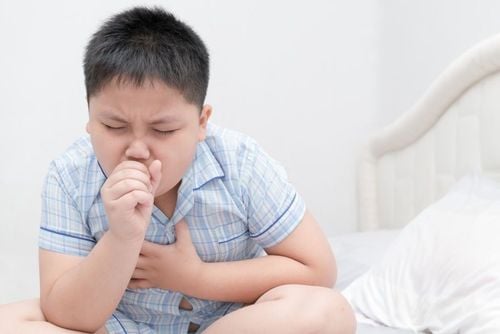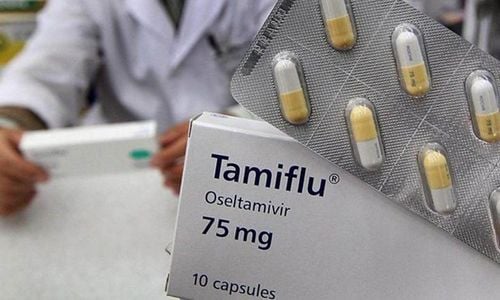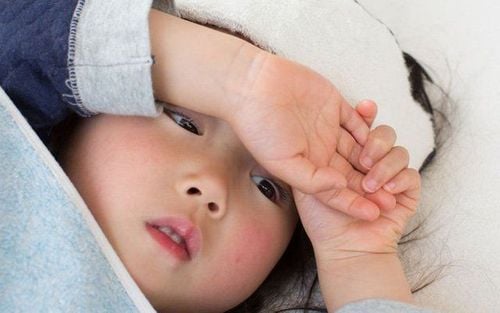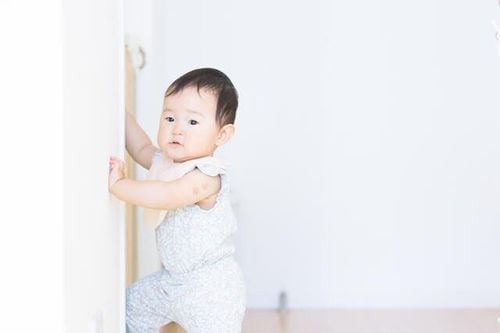This is an automatically translated article.
The article was professionally approved by Master, Doctor Dang Huy Toan - Department of Pediatrics - Neonatology - Vinmec Nha Trang International General HospitalThe drug is not recommended for babies with colds. Instead, parents should use natural, effective and safer treatments such as adding water, increasing moisture in the nose, suctioning mucus, raising the bed.
1. Limit the use of cold medicine
Colds in infants and young children are common during the first few years of life. It is estimated that from birth to 1 year old, children can have up to 7 colds with symptoms of runny nose, insomnia at night. How to effectively treat colds for children and minimize the number of illnesses? Decongestants are not recommended for children under 2 years of age. Instead, mothers and fathers are advised to use all-natural remedies to relieve cold symptoms for children.2. Add plenty of water for children with colds
Water and milk are two recommended drinks for children. They work to thin mucus, reduce nasal congestion and minimize the risk of dehydration for children. Mothers should give their babies breast milk or formula regularly. Do not give your child soft drinks or juices because of their high sugar content. If you want to know if your child is drinking enough water, the best way is to check the child's urine, the child has drank enough water with light colored urine. If the urine color is dark, the child should be encouraged to drink more water.
Bổ sung nhiều nước cho trẻ bị cảm lạnh
3. Clean up the baby's nose
A cold can cause an increased amount of mucus in the nose, causing a child to have a stuffy nose. Therefore, nasal hygiene is an important part of improving a child's breathing ability. Mothers are advised to use a nasal aspirator to clear mucus in their baby's nose. How to use: Squeeze the bulb and place it with a distance of 0.5 - 2cm into one nostril. Release the ball to create suction. Remove the instrument, squeeze the bulb to remove the mucus. Wash tools with soap and water after use.4. Use saline nasal drops
Saline nasal drops with the ability to liquefy mucus should be effective in reducing nasal congestion for children. Therefore, mothers can buy saline drops or syrups at pharmacies or make their own by stirring half a teaspoon of table salt into a cup of warm water. How to instill saline for children is done as follows: Put the child on his back and use a syringe to drop 2-3 drops into each nostril of the child. Wipe clean or use a nasal aspirator to suck the mucus out.5. Raise the head of the child's bed
Help a child with a cold sleep better by raising the head of the child's bed. This makes it easier for the mucus to drain, making it easier for the baby to breathe. If the bed cannot be raised, you can use an alternative method of placing a few books or rolled towels under the mattress to raise the child's bed. Never put too many pillows under the baby's head because it increases the risk of suffocation or sudden infant death syndrome (SIDS).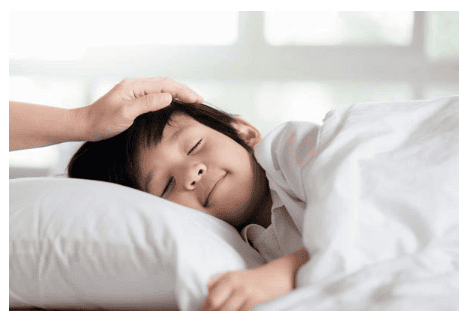
Giúp trẻ bị cảm lạnh ngủ ngon hơn bằng cách nâng đầu giường của trẻ lên cao
6. Improve colds by feeding children chicken soup
Many research results show that chicken soup helps improve cold conditions. To explain this, scientists think that the nutrients in ingredients, like chicken and vegetables, calm inflammation. And sipping warm broth can thin mucus and relieve congestion. If your baby is just starting to eat solids, make soup to puree or just drink broth.7. Mist humidifiers help relieve cough and stuffy nose
Increasing humidity in the air can help relieve coughs and congestion in children. For your child's safety, use a mist humidifier. Families should pay attention to adjust steam and hot water appropriately to avoid causing burns to children. It is also important to change the water daily, cleaning according to the manufacturer's instructions. This helps limit the growth of mold and bacteria.8. Sauna with children in the bathroom
Another way to relieve a baby's stuffy nose is to use a steam bath in the bathroom. Take a hot shower and close the bathroom door to increase the steam in the room. Then, sit with your child in the bathroom for 10 to 15 minutes. Bring books or toys with you to naturally extend time in the bathroom. Breathing in warm, moist air helps to increase nasal circulation. The right time to have a sauna is right before bedtime to help your baby fall asleep more easily.9. Avoid exposing children to secondhand smoke
Secondhand smoke can make a child's cold worse by irritating his throat and nose. In fact, children who breathe in secondhand smoke are less likely to have a worse cold, and are more likely to develop bronchitis or pneumonia. Stay away from cigarette smoke and ask that no one smoke in your home.10. Encourage rest
Sleep is key to a healthy immune system, which helps children fight off cold viruses. To help your child get a good night's sleep, clear mucus with saline drops and a nasal aspirator before naps and before bed. And give your baby lots of cuddles because your gentle touch can ease the discomfort, creating a feeling of relaxation for the baby.
Nước muối nhỏ mũi với khả năng hóa lỏng chất nhầy nên có tác dụng giảm nghẹt mũi cho trẻ hiệu quả
11. Try a sponge bath
A warm sponge bath can help calm a child's fever, lowering the temperature by a few degrees. Fill the tub with 1-2 inches of warm water and use a sponge or washcloth to wipe the baby's body. Do not use cold water, ice or alcohol. If the water gets cold, take the child out of the tub.For children to be healthy and develop well, it is necessary to have a nutritious diet in terms of quantity and quality balance. If children are not provided with adequate and balanced nutrients, it will lead to diseases of excess or lack of nutrients, which adversely affect the comprehensive development of children in terms of physical, mental and motor skills.
Children who do not eat properly are at risk of micro-mineral deficiency causing anorexia, growth retardation, malabsorption,... If they notice the above signs, parents should supplement their children with products. The supplement contains lysine, essential micro-minerals and vitamins such as zinc, chromium, selenium, and B vitamins to help fully meet the nutritional needs of children. At the same time, these essential vitamins also support digestion, enhance nutrient absorption, help improve anorexia, and help children eat well.
Parents can learn more:
Signs of zinc deficiency in children
Micronutrient deficiency and failure to gain weight in children
Please regularly visit Vinmec.com website and update useful information to take care of your child. Take care of the baby and the whole family.
Reference source: webmd.com




